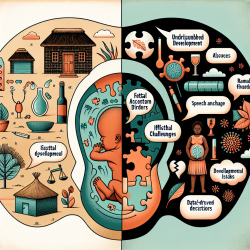Introduction
As professionals in the field of speech-language pathology, we are well aware of the importance of data-driven decision-making. Similarly, in the realm of environmental science, data plays a crucial role in identifying effective practices for addressing global challenges such as food security, climate change mitigation, and land degradation. The research article titled "Which practices co-deliver food security, climate change mitigation and adaptation, and combat land degradation and desertification?" by Smith et al. (2020) provides a comprehensive analysis of 40 practices that aim to address these pressing issues.
Key Findings from the Research
The study identifies nine practices that deliver medium to large benefits across all four land challenges: food security, climate change mitigation, adaptation, and combating land degradation and desertification. These practices include:
- Increased food productivity
- Dietary changes
- Reduced food loss and waste
Additionally, the research highlights five practices with large mitigation potential, exceeding 3 Gt CO2eq/year, without adverse impacts on other land challenges. Furthermore, 16 practices demonstrate large adaptation potential, benefiting over 25 million people, without negative side effects on other challenges.
Practical Implications for Practitioners
For practitioners in the field of environmental management, integrating these practices into land management strategies can significantly enhance outcomes. By focusing on practices that offer co-benefits, practitioners can create synergies that address multiple challenges simultaneously.
Here are some actionable steps practitioners can take:
- Promote Sustainable Agricultural Practices: Encourage the adoption of practices that enhance food productivity while reducing environmental impacts.
- Implement Risk Management Strategies: Utilize value chain options and risk management practices that do not require dedicated land, thus minimizing competition for resources.
- Advocate for Policy Changes: Support policies that incentivize practices with large mitigation and adaptation potential.
Encouraging Further Research
While the research provides valuable insights, it also highlights the need for further studies to refine and expand the understanding of these practices. Practitioners are encouraged to engage in research initiatives that explore the local context and scalability of these practices.
Collaboration with academic institutions and research organizations can lead to innovative solutions tailored to specific regional challenges. By contributing to the body of knowledge, practitioners can help shape sustainable land management practices that are both effective and adaptable.
Conclusion
The integration of practices that co-deliver food security, climate change mitigation, and adaptation, while combating land degradation, is essential for creating sustainable outcomes. By leveraging the findings of Smith et al. (2020), practitioners can make informed decisions that contribute to global sustainability goals.
To read the original research paper, please follow this link: Which practices co-deliver food security, climate change mitigation and adaptation, and combat land degradation and desertification?










